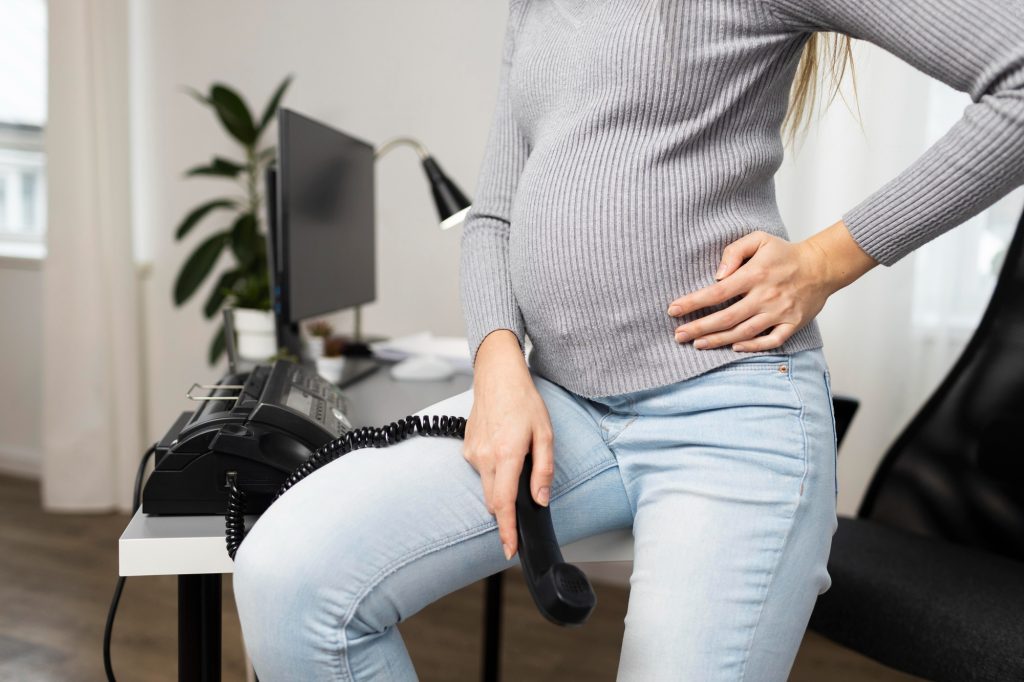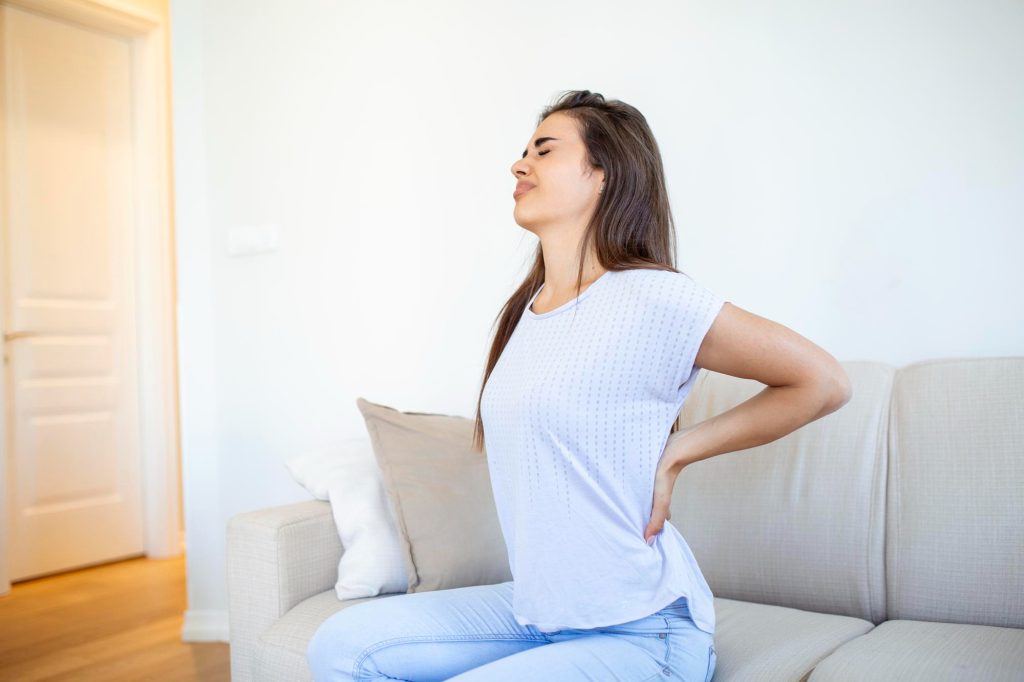Discover the connection between emotional factors, stress, and the duration of postpartum back pain.
How Emotional Factors and Stress Impact Postpartum Back Pain Duration
Postpartum back pain can be a real pain in the… well, you know where. But have you ever wondered why some women experience back pain for longer periods than others? It turns out that emotional factors and stress play a significant role in postpartum back pain duration. So, let’s dive into the nitty-gritty of this intriguing phenomenon.

Understanding Postpartum Back Pain
Before we delve into the impact of emotional factors and stress, let’s take a moment to understand what postpartum back pain is all about. When you become a new mom, your body goes through numerous changes, including hormonal fluctuations and physical adjustments. These changes can put strain on your spine, leading to those dreaded backaches.
But what exactly happens to your body during this time? Let’s explore the anatomy of postpartum back pain in more detail.
The Anatomy of Postpartum Back Pain
Picture this: you’re carrying around your precious bundle of joy, and your back is feeling the weight of the world. This is because the ligaments in your back become more flexible during pregnancy, making it easier to support your baby bump. However, once your little one arrives, those loosened ligaments may struggle to regain their former strength and stability.
But it’s not just the ligaments that are affected. The muscles in your back also play a significant role in postpartum back pain. During pregnancy, these muscles work overtime to support the growing baby and maintain balance. However, after giving birth, they may become weakened and fatigued, contributing to the discomfort you feel.
Additionally, the strain from breastfeeding, lifting your baby, and constantly bending over to pick up toys or clean up messes can exacerbate the back pain. It’s like a never-ending workout, only without the toned abs.
Now that we’ve covered the anatomy, let’s explore some common causes of postpartum back pain.
Common Causes of Postpartum Back Pain
Aside from the physical changes, there are several common culprits behind postpartum back pain. One of the top offenders is improper posture. Let’s be honest, between sleep deprivation and juggling a newborn, sitting up straight is not always a top priority. But slouching and hunching can put unnecessary stress on your back and prolong the pain.
Carrying excess baby weight is another factor to consider. No, we’re not talking about the adorable chub on your little one’s cheeks. Rather, it’s the extra pounds you put on during pregnancy and haven’t quite shed yet. That additional weight puts strain on your back, making it feel like it’s carrying the weight of the world (or at least a tiny human).
But it’s not just the physical factors that contribute to postpartum back pain. Emotional factors and stress can also play a significant role. The transition to motherhood can be overwhelming, and the constant demands of caring for a newborn can take a toll on your mental well-being. Stress and anxiety can manifest as tension in your muscles, leading to increased back pain.
Furthermore, lack of sleep can exacerbate the pain you feel. Sleep deprivation is a common struggle for new moms, and the exhaustion can make your muscles more prone to aches and discomfort.
It’s important to remember that postpartum back pain is a common experience for many new moms, and you’re not alone in this journey. Understanding the causes and anatomy of the pain can help you take proactive steps towards finding relief and improving your overall well-being.
The Role of Emotional Factors in Postpartum Back Pain
Now, here’s where things get interesting. It turns out that emotions can have a surprising impact on postpartum back pain. Who would’ve thought that our feelings could reach all the way down to our backs? Let’s explore this intriguing connection further.
But first, let’s take a moment to understand the complexity of the human body. Our bodies are not just a collection of bones, muscles, and organs. They are intricately connected systems, where every part influences and interacts with the others. This includes our emotions, which can have a profound effect on our physical well-being.
Emotional Stress and Physical Pain: The Connection
You’ve probably heard of the mind-body connection, right? Well, it’s not just some fancy phrase. Your emotions can actually affect your physical well-being, including your enjoyment of back pain (said no one ever). When you’re stressed out, your body releases stress hormones that can increase muscle tension and inflammation, leading to more intense and prolonged pain.
Imagine this scenario: you’re a new mom, sleep-deprived and overwhelmed with the demands of taking care of a newborn. Your stress levels are through the roof, and your body is constantly on high alert. As a result, your muscles become tense, and inflammation sets in, making your back pain even worse. It’s like a vicious cycle that seems impossible to break.
So, the next time you’re dealing with a crying baby, sleep deprivation, and a pile of dirty diapers, remember that your stress levels may be contributing to your back pain. It’s like a double whammy of discomfort.
Emotional Factors Specific to Postpartum Period
When it comes to postpartum back pain, there are specific emotional factors that come into play. First and foremost, the rollercoaster of hormones post-pregnancy can wreak havoc on your emotions. From the joy and excitement to the occasional baby blues, your emotional state can impact how you experience and cope with back pain.
But it’s not just hormones that play a role. The postpartum period is a time of immense change and adjustment. You may be grappling with the challenges of breastfeeding, sleep deprivation, and the overwhelming responsibility of caring for a newborn. All of these factors can contribute to heightened stress levels, which in turn can exacerbate your back pain.
Additionally, the pressure to be the perfect mom and the fear of not meeting societal expectations can add an extra layer of stress to your life. The constant comparison to other moms on social media, the unsolicited advice from well-meaning relatives, and the internalized pressure to do everything “right” can take a toll on your emotional well-being. It’s enough to make anyone want to scream into a pillow… or eat an entire bag of chocolate. Hey, no judgment here!
So, the next time you find yourself experiencing postpartum back pain, take a moment to acknowledge the emotional factors that may be contributing to your discomfort. Remember to prioritize self-care, seek support from loved ones, and be gentle with yourself. After all, being a new mom is no easy feat, and your emotional well-being is just as important as your physical health.
Stress as a Major Contributor to Postpartum Back Pain
Stress, oh stress, you sneaky little devil. Not only do you mess with our minds, but you also have a way of infiltrating our bodies and causing all sorts of trouble. Let’s take a closer look at how stress contributes to the duration of postpartum back pain.
The Physiology of Stress and Pain
When you’re stressed, your body releases a delightful concoction of hormones and chemicals. But here’s the not-so-delightful part: these substances can heighten your sensitivity to pain and make your backache feel like it’s on steroids. Not the kind of performance enhancement we had in mind, right?
On top of that, stress can also lead to muscle tension and poor posture habits. It’s like a domino effect of discomfort. One minute, you’re stressing over that pile of laundry that never seems to disappear, and the next, you’re slouched over with a throbbing back.
Stress Management Techniques for Postpartum Back Pain
Now that we know stress is not a friend to our backs, it’s time to kick it to the curb. Don’t worry; you don’t have to meditate on a mountaintop or contort yourself into a pretzel to find relief (although a pretzel does sound delicious right now).
Simple stress management techniques can work wonders for alleviating postpartum back pain. Taking short breaks throughout the day to stretch and relax your stiff muscles can make a world of difference. Engaging in activities that bring you joy and help you unwind, such as reading a book or listening to music, can also help you bid stress farewell.
The Duration of Postpartum Back Pain: An Overview
Now that we’ve covered the impact of emotional factors and stress, let’s turn our attention to the duration of postpartum back pain. After all, we’d like to know when this backache nightmare ends, don’t we?

Factors Influencing the Duration of Postpartum Back Pain
Several factors can influence how long you have to endure the joy (cough…sarcasm) of postpartum back pain. The severity of your pain, the presence of underlying conditions, and how well you take care of your physical and emotional well-being can all affect the duration.
Consistently practicing good posture, engaging in regular exercise (with your healthcare provider’s approval, of course), and managing stress levels can help expedite the healing process. Remember, being a supermom doesn’t mean sacrificing your own well-being. Take care of yourself, and your back will thank you.
The Long-Term Impact of Emotional Stress on Back Pain
Now, here’s a sobering thought that may make you want to put on your superhero cape: emotional stress during the postpartum period can have a long-term impact on your back pain. Yikes!
Research suggests that unresolved emotional stress can lead to chronic pain conditions, including persistent backaches. So, it’s essential to address any emotional issues you may be facing after giving birth. Don’t hesitate to seek support from friends, family, or professionals who can lend an empathetic ear and help you navigate this challenging journey.
Approaches to Manage and Alleviate Postpartum Back Pain
Now that we’ve equipped you with a wealth of knowledge about postpartum back pain, let’s explore some approaches to manage and alleviate it. Because hey, no one wants to be stuck in a never-ending cycle of pain.
Medical Interventions for Postpartum Back Pain
If your postpartum back pain is persistent and interfering with your daily activities, it may be time to consider medical interventions. Your healthcare provider may suggest treatments such as physical therapy, chiropractic care, or pain medication to assist in your healing journey.
It’s crucial to have open and honest conversations with your healthcare provider to determine the best course of action for addressing your specific needs. Remember, they’re there to support you and help you find relief.
Non-Medical Approaches to Manage Postpartum Back Pain
If you’re not keen on taking a pill or visiting a healthcare provider, don’t fret. There are plenty of non-medical approaches you can try to manage and alleviate your postpartum back pain.
The good news is that most non-medical approaches are safe and can be incorporated into your daily routine without too much hassle. From hot or cold compresses and gentle exercises to prenatal massages and relaxation techniques, the options are aplenty. Find what works best for you and your body, and take that first step towards a pain-free existence.
So, there you have it. The ins and outs of how emotional factors and stress impact postpartum back pain duration. Remember, becoming a mom is an extraordinary journey filled with ups and downs (both physically and emotionally). Take care of yourself, embrace the joyous moments, and know that the back pain won’t last forever. You’ve got this, supermom!



